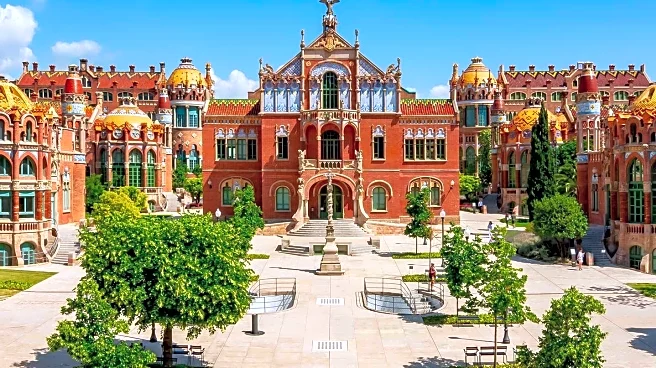What's Happening?
Barcelona councillors have approved plans to convert the former Comèdia cinema into a new Carmen Thyssen museum. The project, celebrated by Mayor Jaume Collboni, aims to boost the city's cultural profile
by attracting significant artworks. The museum will occupy the cinema's iconic building in the Eixample district, expanding its floorspace by 45% to nearly 10,000 sq. m. The design includes a 450-seat auditorium, shops, a restaurant, and educational spaces, with commercial activities accounting for roughly 25% of the total area. The museum will showcase the collection of Carmen Cervera, featuring Spanish, Catalan, and international art. The project is financed by Stoneweg, with an expected investment of around €100m.
Why It's Important?
The approval of the Carmen Thyssen museum project is significant for Barcelona's cultural landscape, as it promises to elevate the city's international art profile. By attracting renowned artworks, the museum could enhance tourism and local engagement with the arts. However, the inclusion of commercial spaces has sparked criticism from opposition parties, who argue it blurs the line between cultural and commercial interests. This development highlights the ongoing debate over the role of commercial activities in cultural institutions and their impact on preserving historical sites.
What's Next?
Construction is expected to begin later this year, with the museum set to become a new cultural hub in Barcelona. The project may face further scrutiny from opposition parties concerned about the balance between cultural and commercial spaces. As the museum progresses, stakeholders will likely monitor its impact on local businesses and tourism. The success of the museum could influence future cultural projects in the city, potentially setting a precedent for integrating commercial elements into cultural institutions.
Beyond the Headlines
The transformation of the Comèdia cinema into a museum raises questions about the preservation of historical buildings and the ethical implications of commercializing cultural spaces. The project reflects broader trends in urban development, where cultural initiatives are increasingly intertwined with commercial interests. This shift may affect how cities prioritize cultural heritage and economic growth, prompting discussions on sustainable urban planning and the role of private investment in public cultural projects.












